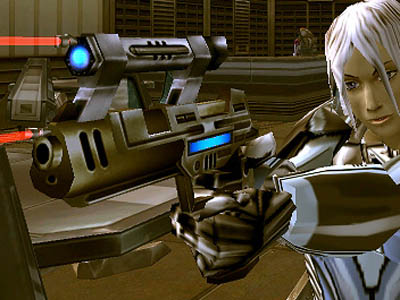MindArk has found some pretty creative ways to further monetize the elements in its game. In October, the developer put a highly-desirable plot of real-estate up for auction within its gameworld -- a full-featured space station built on a mineral-rich asteroid. This wasn't the first time it's done so, but as you'll see, it's definitely the most newsworthy. The opening bid was one PED (about $.10 USD). The buyout? 1,000,000 PED ($100,000 USD). And it sold. The buyer is a man named "Neverdie," who goes by the name of Jon Jacobs in real life. And make no mistake: the plot of land, set to pass over into his possession this month, has some pretty beefy earning potential.

A laz0r gun that goes "pew pew pew?" Priceless.
The commerce models at work in Project Entropia are such that someone like Jacobs can monetize his land pretty effectively, provided there are enough players willing to take advantage of it. Primarily, his space station will feature ten "bio-domes" -- think of them as private hunting areas -- that players can pay to access. The players, of course, will theoretically earn their money back (and then some) by looting their kills. Jacobs, meanwhile, will get paid from them accessing his land, as well as from any taxes he chooses to impose upon their earnings. The same thing is true for mining. Since the station is located on an asteroid, after all, there are bound to be minerals aplenty. Here again, Jacobs can tax players' earnings.
There will also be both residential space available (to the tune of 1000 separate apartments), as well as a hearty, 100-market-stall-strong commercial zone. Jacobs can opt to sell individual shops and apartments, or rent them out. In either case, there's a chunk of change to be made.


